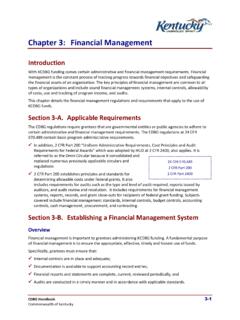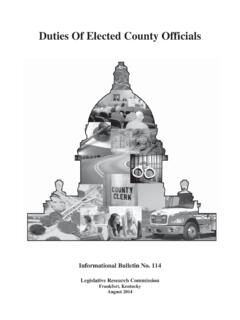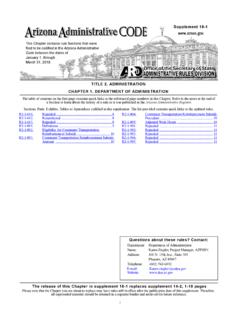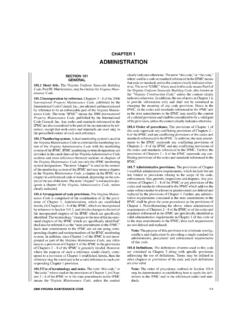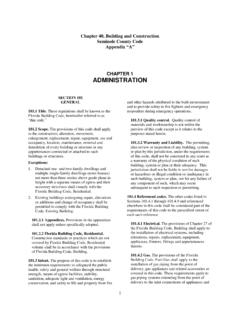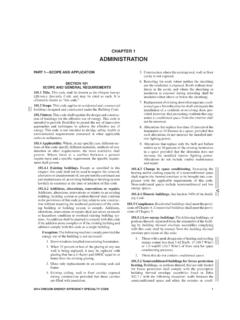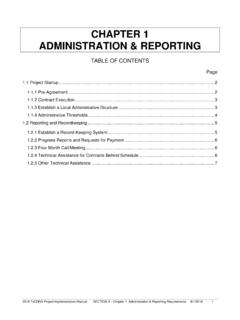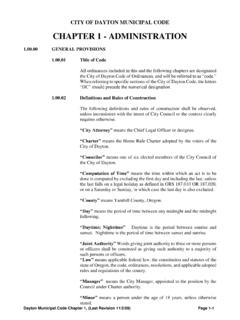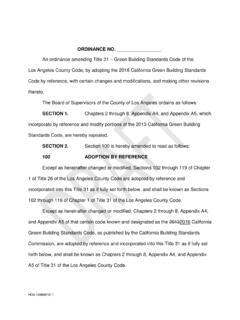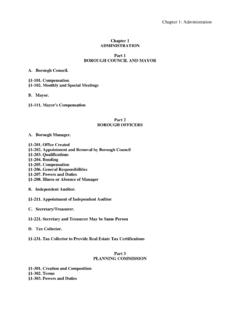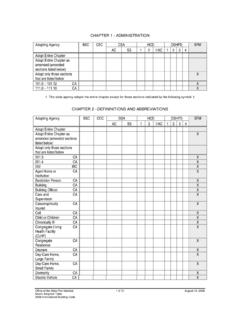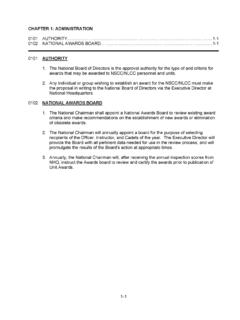Transcription of Chapter 1: Project Administration - Kentucky
1 CDBG Handbook 1-1 Commonwealth of Kentucky Chapter 1: Project Administration Introduction Administering Kentucky Community Development Block Grant (KCDBG) grants requires regular attention to grant requirements and deadlines. This Chapter provides grantees with general information on how to administer a CDBG grant from the Department for Local Government (DLG). The Chapter details requirements for certified grant administrators, grant award procedures, release of grant funds, citizen participation and grievances, conflict of interest, and record maintenance. This Chapter addresses the following: 1. Certified Grant Administrator Requirement 2. Grant Award Procedures 3. Release of Grant Funds 4. Citizen Participation and Grievance Procedures 5. Conflict of Interest 6. Meeting a National Objective 7. Project Signage 8. Applicable Laws and Regulations 9. Maintaining Records From the award of the grant-to-grant close out, the grant follows a specific course.
2 Section 1-A. Certified Grant Administrator Requirement The Commonwealth of Kentucky requires that individuals administering CDBG funds be officially certified by DLG as CDBG Administrators. Certification Requirements To be certified as a CDBG Administrator, first time attendees must participate in the DLG-sponsored CDBG Administrator Certification training and pass a test, which is administered at the culmination of the training. The test follows a comprehensive CDBG Administrator training, which is delivered periodically to allow individuals interested in CDBG Administration the opportunity to become certified. The course will be marketed by the Commonwealth of Kentucky via the DLG website and email. Check the DLG website or reach out to a DLG representative for the dates the workshop is offered. Upon completion of the training, individuals will be informed within approximately 60 days if they have successfully completed the test and received the certification.
3 It is important to note that it is the individual who attended the training and passed the test that receives the certification, not the firm that employs the individual. Therefore, if an individual leaves the The basic rules in this KCDBG manual may also apply to CDBG-Disaster Recovery (CDBG-DR) or National Disaster Resiliency Competition (NDRC) grant-funded projects; however, those funding allocations have additional or different rules and requirements that would be issued at the time of funding award. Please refer to your DLG Representative and HUD program guidance for questions or clarification. 1-2 November 2016 organization the certification goes with the individual. A new CDBG Administrator at the organization will have to become certified. DLG maintains an updated list of certified CDBG Administrators. The list is updated after new certifications are granted.
4 Periodic workshops are provided for previously Certified Administrators to update their knowledge and maintain the certification. Certified Administrators must attend required trainings (as notified by DLG) or the certification may be revoked. DLG reserves the right to revoke a certification in cases of repeated findings (refer to Chapter 12 for more information on monitoring) or failure to respond to DLG requests in a timely manner. Section 1-B. Grant Award Procedures Background Information Submitting a CDBG funding application to DLG results in either an award or a notice of non-selection. Communities that are selected to receive a grant are sent a preliminary approval letter. This begins the process of setting up the grant and ensuring that all contractual documents are in place. The steps in the process for newly awarded grants are described in this section.
5 Steps in the Process Setting up a new CDBG grant award involves a number of steps. These steps are outlined below. 1. DLG sends the preliminary approval letter to the grantee that announces the award, the amount of the grant, and instructions on how the grantee needs to respond (the process may differ depending on type of grant, , housing, economic development, etc.). If the grantee accepts the terms specified in the preliminary approval letter, the Chief Executive Officer (CEO) will sign and return the offer. 2. The CEO of the grantee community attends a grant agreement conference with DLG staff and key parties such as the grant administrator, engineer/architect, subrecipient, etc. The meeting format and topics discussed will vary depending upon the type of grant. 3. After the grant agreement meeting, the CEO of the grantee community reviews the agreement with their legal counsel and both parties sign the agreement.
6 4. Two copies of the signed grant agreement are returned to DLG. 5. DLG processes and executes the grant agreement through the State approval system and defines all effective dates. 6. DLG maintains one copy of the grant agreement and sends the other copy back to the grantee for its records. Grant Agreement Provisions The grant agreement typically includes the following requirements and provisions: Legal boilerplate information, Chapter 1: Project Administration CDBG Handbook 1-3 Commonwealth of Kentucky 2 CFR 200 (Subpart F) on audit information and requirements, Names and addresses of grantee and contacts, List of activities to be completed, A cost summary, and A list of all evidentiary items that are required prior to a release of funds (discussed in the next Section of this Chapter ). Section 1-C. Release of Grant Funds In order for the grantee to begin spending the grant funds, certain evidentiary materials must be submitted to DLG.
7 Evidentiary Materials Required The grant agreement specifies which evidentiary materials are required for submission to DLG. DLG must receive and approve these materials before the grantee may expend any Project funds for specified activities. Evidentiary materials will be required for the following items: Completion of an environmental review/environmental certification and required documentation ( , tear sheets for required notices) (See Chapter 2: Environmental Review); Firm commitments for other funds anticipated in the approved application. The local contribution should be placed in a restricted account for Project use only; Evidence of mandatory sewer hook-up ordinance; Approval of Budget Ordinance/Amendment; Approval of Anti-displacement and Relocation Assistance Plan; Copy of adopted resolution approving the CDBG procurement code (see Chapter 4: Procurement); Cost overrun resolution stating that any cost overruns will be paid for by the grantee; State Clearinghouse assurance and comments; State Historic Preservation Office (SHPO) approval letter (See Chapter 2: Environmental Review); Evidence that tribal consultation requirements have been met (See Chapter 2: Environmental Review); Fair Housing Resolution or Ordinance (See Chapter 7: Fair Housing).
8 Policy of Non-Discrimination on the Basis of Disability Status (for grantees with 15 or more employees) (See Chapter 7: Fair Housing); Section 504 Accessibility Self Evaluation and Transition Plan (See Chapter 7: Fair Housing); Chapter 4: Procurement Chapter 2: Environmental Review Chapter 7: Fair Housing 1-4 November 2016 Title VI Self Survey and Statement of Assurance or Title VI Implementation Plan (See Chapter 7: Fair Housing); Drug Free Workplace Statement; Submission of legally binding commitments between subrecipients, private participants and the grantee; Fully executed grant agreement; Authorized Signature and Electronic Transfer of Funds Forms (See Chapter 3: Financial Management); and Other possible documents: Submission of loan or lease agreements, as applicable; Submission of security documents, as applicable; Submission of certification by legal counsel relating to each of the above documents; and Submission of revolving fund procedures as applicable.
9 Similar to other community projects, economic development activities often require pre-approval of legal agreements, due to the participation of private, for-profit businesses in these projects. In addition to the above required materials, special conditions or materials may be required depending on the type of grant funded. It is recommended that the grantee submit all of the evidentiary items together in one package. The grantee should not hesitate to contact DLG with any questions, as delays in submitting these materials will delay program implementation. Request for Approval of Evidentiary Materials and Release of Funds After completing the evidentiary materials, the grantee should prepare the Request for Release of Funds and attach the necessary documentation (see Attachment 1-1: Request for Approval of Evidentiary Materials and Release of Funds). DLG will review the Request for Release of Funds and other documentation, and notify the grantee upon approval.
10 Once approval is received, the grantee can begin expending Project activity funds. Note: Grantees should note that DLG may terminate the grant and grant agreement if the required evidentiary and release of funds documentation are not submitted to the department within 90 days of the date of the preliminary approval letter. Note: If the grantee obligates or expends any Project funds for any activity (except for those costs relating to engineering and planning, as applicable) prior to DLG approval of the environmental clearance, these costs are considered an ineligible use of KCDBG funds and the grantee will be denied payment for such expenses. Attachment 1-1: Request for Approval of Evidentiary Materials and Release of Funds Chapter 3: Financial Management Chapter 5: Contracting Chapter 1: Project Administration CDBG Handbook 1-5 Commonwealth of Kentucky Section 1-D.
